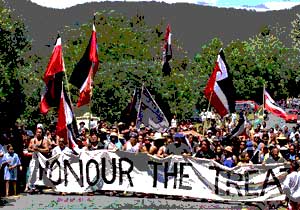
OPINION: AUCKLAND (Herald on Sunday / Pacific Media Watch): Today is New Zealand's Waitangi Day. It's our National Day where we've got used to seeing a bit of biffo at Waitangi. It gives the media something for primetime to scare the white folk with.
The media build-up for the few days beforehand is some Maori-Pakeha divide - manufactured or not - hoping like hell there's a bit of drama on the day so reporters can breathlessly report the scary native goings-on to a shocked nation.
The Don Brash visit in 2004 was the best. He said the natives were being far too pampered and white people were sick of Maori special privileges. He never spelled out what those privileges were, although I presume hogging up more than their fair share of prison cells and hospital beds could have been justified.
I smiled when one astute observer noted Maori would have loved the taxpayer privileges Brash had received in his lifetime.
But the descendants of the other partner at the Treaty of Waitangi loved Brash's sense of victimhood. When Brash was clobbered with a clod of dirt, his minders went into fits of delirious ecstasy. We watched with astonishment when he came within one seat of becoming prime minister the following year.
A truly scary thought.
Helen Clark's speaking invitation in 1999 was memorable for different reasons. We watched our iron maiden in tears after Waitangi's real iron maiden, Titiwhai Harawira, who had campaigned for equal rights for women on marae for years, objected.
Humiliating treatment
She queried why a Pakeha woman should be allowed to speak on a marae but not wahine. Clark was so humiliated she refused to return.
Harawira with others had been going to Waitangi since she was a young woman to protest about the hypocrisy of celebrating the Treaty.
She has become the Matriarch of the Lower Marae and no prime minister is safe to enter where the political action occurs without the old tempest battler draped on their arm to protect them.
Mahatma Gandhi would have acknowledged a real contender in how to turn the tables on an opponent.
Once the Maori Party was elected to Parliament in 2005, however, a lot of the politics concerning Maori grievances moved to Parliament. Waitangi Day excitement died down.
When the Maori Party, surprisingly, got into bed with Brash's former party it became even quieter - boring wouldn't be an exaggerated description.
The best the media could come up with was misreporting comments supposedly critical of the National Party from local MP Hone Harawira at a forum at last year's celebrations that led to his expulsion.
This week, it seemed possible Waitangi would return to his proud protest history when National ineptly tried to sneak past the Maori Party references to the Treaty of Waitangi in the sales terms of the public assets they want to flog off. They know a buyer ain't going to go after an asset if Maori interests can interfere by claiming Treaty consultation rights.
The huffing by Tariana Turia and her fellow Maori Party leader Pita Sharples that they might resign from the Government in protest is nonsense. They'd halve their salary, have to sack their staff and leave behind their ministerial homes and cars. It's really just a matter of saving face. I'm sure Key will come up with a fig leaf of sorts to get them off the hook.
But the incident potentially revitalises our tradition of Waitangi Day being a focus of protest to raise the Maori and Pakeha state of play and its implications for our country.
Whatever your political stripes you should make at least one trip to our historical birthplace on Waitangi Day. The protests on the lower marae and the pomp at the upper marae are part of our heritage.
I hope there is a protest today about our asset sales. Maori know perfectly well what happens when you lose control of your birthright.
Matt McCarten is a political strategist, commentator and Herald on Sunday columnist.

This work is licensed under a Creative Commons Attribution-NonCommercial 3.0 New Zealand License.



